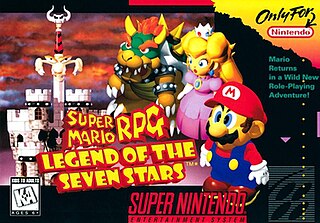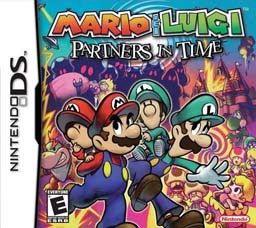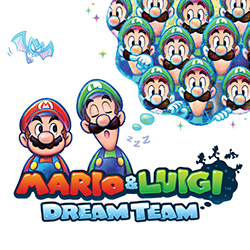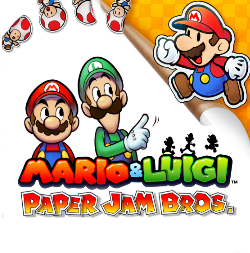
Luigi's Mansion is a 2001 action-adventure game developed and published by Nintendo. The game was a launch title for the GameCube and was the first game in the Mario franchise to be released for the console; it was released in Japan on September 14, 2001, in North America on November 18, 2001, in Europe on May 3, 2002, and in Australia on May 17, 2002. It is the third video game in which Luigi is the main character instead of Mario, after Mario Is Missing! and Luigi's Hammer Toss. Players control him as he explores a haunted mansion, searches for Mario and deals with ghosts by capturing them through a vacuum cleaner supplied by Professor E. Gadd.

Super Mario RPG: Legend of the Seven Stars is a 1996 role-playing game developed by Square and published by Nintendo for the Super Nintendo Entertainment System (SNES). It was the final Mario game published for the SNES. The game was directed by Chihiro Fujioka and Yoshihiko Maekawa, produced by Shigeru Miyamoto, and scored by Yoko Shimomura.

Mario & Luigi: Superstar Saga is a 2003 role-playing game developed by AlphaDream and published by Nintendo for the Game Boy Advance. It was re-released for the Wii U's Virtual Console in 2014, Nintendo Switch Online Service in 2023, and remade for the Nintendo 3DS as Mario & Luigi: Superstar Saga + Bowser's Minions in 2017. In the game, Mario and Luigi travel to the Beanbean Kingdom in order to combat Cackletta and Fawful, who stole Princess Peach's voice for the purpose of harnessing the power of a special artifact called the Beanstar.

Mario & Luigi: Partners in Time is a role-playing video game developed by AlphaDream and published by Nintendo for the Nintendo DS handheld game console in late 2005. It is the second game in the Mario & Luigi series, and is the prequel/sequel to the 2003 Game Boy Advance game Mario & Luigi: Superstar Saga. The game was later re-released for the Wii U as a Virtual Console title in 2015, available for purchase from the Nintendo eShop.

Tomato Adventure is a role-playing video game developed by AlphaDream and published by Nintendo for the Game Boy Advance on January 25, 2002, exclusively in Japan.
Athena Co. Ltd. was a Japanese video game developer, founded in July 1987.

Sangokushi Taisen is a hybrid physical and digital collectible card game for the arcade, on the Chihiro arcade board. It is a real-time strategy-based game set in the Three Kingdoms period of Chinese history and the 14th century Chinese novel Romance of the Three Kingdoms by Luo Guanzhong. It uses the same housing as World Club Champion Football, with a sensitive playing area that can detect the position of the physical cards. Over 500 million trading cards have been shipped. It is the sixth trading card arcade game by Sega, following World Club Champion Football,Mushiking: The King of Beetles, The Key of Avalon,Love and Berry: Dress up and Dance! and Quest of D.
Chihiro Fujioka is a video game designer and composer, as well as rock drummer. He has worked at Xtalsoft, Square, and AlphaDream where he is primarily known for directing Super Mario RPG as well as his involvement in several Mario & Luigi games. He is currently a member of Earthbound Papas, a band led by Nobuo Uematsu.

Mario & Luigi: Bowser's Inside Story is a role-playing game developed by AlphaDream and published by Nintendo for the Nintendo DS handheld game console in 2009. It is the third game in the Mario & Luigi role-playing series. It uses the interactive screens of the DS in some of its gameplay mechanics while also introducing several elements that would be used in the series' future gameplay.

Mario is a Japanese multimedia franchise created by Japanese game designer Shigeru Miyamoto for video game company Nintendo, which produces and publishes its installments. Starring the titular Italian plumber Mario, it is primarily a video game franchise but has extended to other forms of media, including television series, comic books, a 1993 feature film, a 2023 animated film, and theme park attractions. The series' first installment was 1983's Mario Bros., although Mario made his first appearance in 1981's arcade game Donkey Kong and had already been featured in several games of the Donkey Kong and Game & Watch series. The Mario games have been developed by a wide variety of developers, including Nintendo, Hudson Soft, and AlphaDream. Mario games have been released almost exclusively for Nintendo's various video game consoles and handhelds, from the third generation onward.

Mario & Luigi: Dream Team, known in Europe and Australia as Mario & Luigi: Dream Team Bros., is a 2013 role-playing video game developed by AlphaDream and published by Nintendo for the Nintendo 3DS. It is the fourth installment in the Mario & Luigi series, a part of the larger Mario franchise. The game's story follows Mario and his brother Luigi who, after being invited to Pi'illo Island for a vacation, become embroiled in a journey to retrieve a powerful artifact before Bowser and Antasma use it for evil intentions. The gameplay takes place from a top-down perspective and has the player controlling Mario and Luigi simultaneously, solving puzzles and platformer sessions, and overcoming turn-based battles across Pi'illo Island, the game's overworld. The player also makes use of Luigi's dreams, called the "Dream World", where gameplay shifts to a two-dimensional side-scrolling perspective and emphasizes using Luigi-based gimmicks to their advantage. Combat in both worlds is turn-based.

Mario vs. Donkey Kong is a puzzle-platform game series published by Nintendo. A spin-off of both the Mario and Donkey Kong franchises, the series marks the return of both Pauline and the rivalry between Mario and Donkey Kong.

Mario & Luigi: Paper Jam, known in Europe and Australia as Mario & Luigi: Paper Jam Bros., is a 2015 role-playing video game developed by AlphaDream and published by Nintendo for the Nintendo 3DS console. It is the fifth installment in the Mario & Luigi series, and serves as a crossover between the Mario & Luigi and Paper Mario series, the latter being a cross-genre series developed by Intelligent Systems. In Paper Jam, Luigi accidentally opens a book containing the Paper Mario universe, causing all of its contents to spread into the Mushroom Kingdom; Mario and Luigi, with the help of the befriended Paper Mario, venture to save both Princess Peach universe variants from Bowser, who has teamed up with his paper counterpart as well. In the game, the player controls the trio simultaneously through an overworld to reach Bowser's Castle, and fights enemies in turn-based combat along the way.

Spike Chunsoft Co., Ltd. is a Japanese video game development and localization company specializing in role-playing video games, visual novels and adventure games. The company was founded in 1984 as Chunsoft Co., Ltd. and merged with Spike in 2012. It is owned by Dwango.
Paper Mario is a video game series and part of the Mario franchise, developed by Intelligent Systems and produced by Nintendo. It combines elements from the role-playing, action-adventure, and puzzle genres. Players control a paper cutout version of Mario, usually with allies, on a quest to defeat the antagonist, primarily Bowser. The series consists of six games and one spin-off; the first, Paper Mario (2000), was released for the Nintendo 64, and the most recent, Paper Mario: The Origami King (2020), for the Nintendo Switch.
POI SOFT Co., Ltd. is a Japanese game developer and publisher based in Fukuoka, Japan.
Mario & Luigi is a series of role-playing video games developed by AlphaDream and published by Nintendo for the latter's various video game handheld consoles. The series is a spin-off from Nintendo's trademark Super Mario series and stars the titular characters Mario and Luigi. The games' stories follow the two on a quest to defeat an antagonist, sometimes Bowser but usually a new character. It began in 2003 on the Game Boy Advance with Mario & Luigi: Superstar Saga, with the latest original installment being Mario & Luigi: Paper Jam in 2015 for the Nintendo 3DS. Two other titles in the series, including Superstar Saga, had an additional remake for the Nintendo 3DS. Mario & Luigi: Bowser's Inside Story + Bowser Jr.'s Journey was the last game in the series before AlphaDream declared bankruptcy in 2019, and remains the latest installment in the series.

Geno is a fictional character who first appeared in Square's 1996 role-playing video game Super Mario RPG: Legend of the Seven Stars, which was published by Nintendo for the Super Nintendo Entertainment System. Geno is the name of a doll dressed in a blue hat and cape, which becomes inhabited by a being from the stars known as a Star Warrior. Geno is introduced as one of the game's party members who fights alongside Mario to stop the game's antagonists, the Smithy gang.












